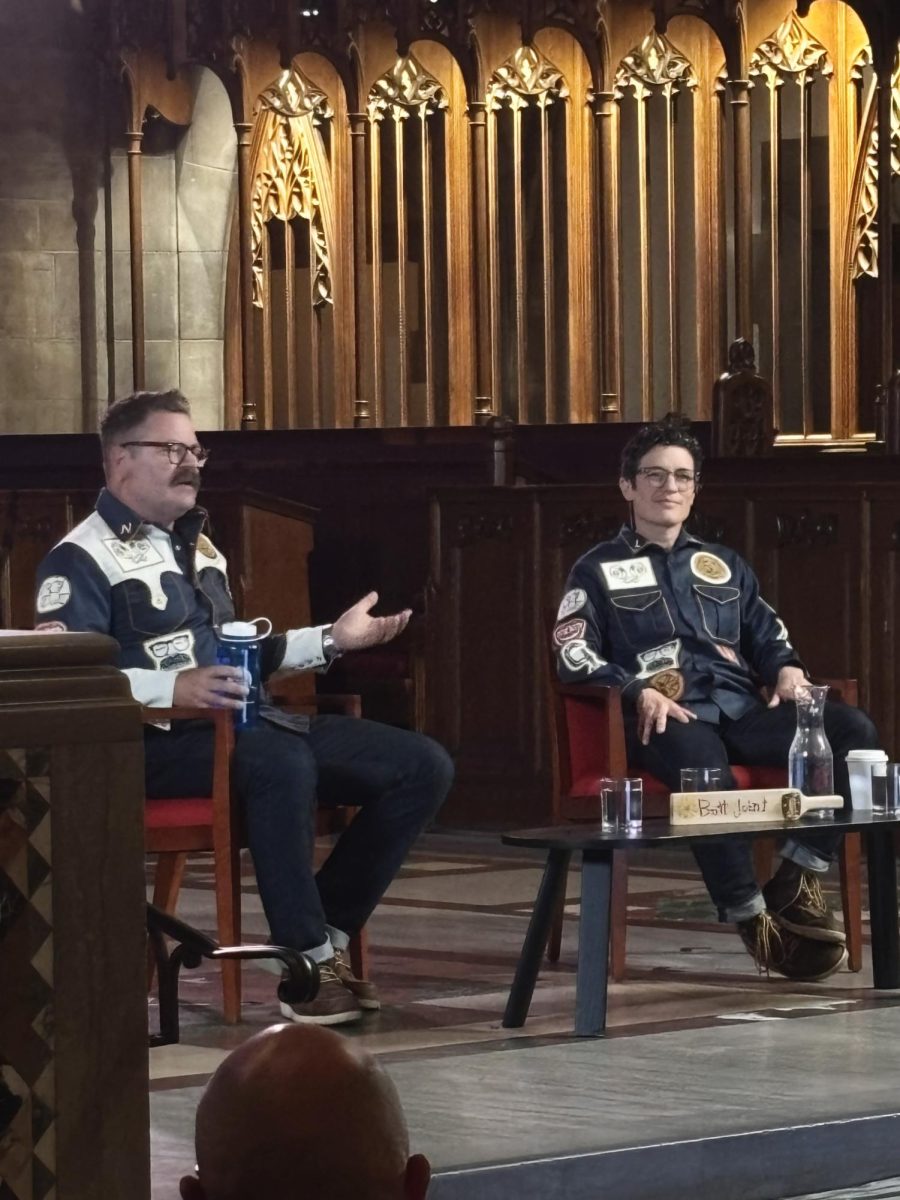The University hosted Nick Offerman and Lee K. Buchanan for its 45th annual Arts and Humanities Day event series on October 18, which drew in over 4,000 total visitors. Featured guests included author Amitav Ghosh, photographer Sally Mann, and writer Roxane Gay. Students, faculty, and staff were offered free tickets to all of the day’s programming.
Offerman, an actor, author, and woodworker, is known for his role as Ron Swanson in the 2009–15 NBC series Parks and Recreation as well as his Emmy-winning guest appearance on HBO’s The Last of Us.
In the event’s closing program, Offerman spoke (and sang) to a sold-out crowd in Rockefeller Memorial Chapel, joined by fellow carpenter and longtime Offerman Woodshop manager Lee K. Buchanan as well as professor of Theater and Performance Studies Leslie Buxbaum. This multimedia event included lecture, musical performance, woodworking tips, and interview portions.
Offerman and Buchanan, clad in matching monogrammed denim shirts, began by discussing Little Woodchucks, their new children’s book containing a collection of family-friendly woodworking advice and projects. “We both were instilled with a similar ethos of self-sufficiency and we were both raised to make things together with our families.… And now I have two kids and am raising them in that same spirit, so this feels like a perfect project for us to take on together,” Buchanan said when asked about the motivation behind the book’s publication. “The spirit of the book,” Offerman added, “is trying to put the brakes on where we feel like our society is going.… We are not of the mind that some of the last elections would go the way they did, but other people don’t read the same books we do, and they don’t know how to use hand tools.”
Offerman’s social concerns do not just pertain to the increasing deficit of manual labor in the face of modern politics and society, though—they also extend to the loss of “manual thinking,” something that he and Buchanan were quick to point out can no longer be taken for granted. The duo expressed consternation over the rising use of AI and the pervasiveness of electronics in children’s lives. “We were also astonished to learn when AI algorithm robots suddenly are taking over the popular consciousness,” Offerman said. “We thought, ‘Well, surely everyone will scoff along with us at this passing fad,’ but the idea that people welcome computers… to do their thinking for them is something that made us really bristle.”
Little Woodchucks, as he described it, intends to reverse this pattern of automation and encourage children and adults alike to engage in hands-on work and learning. “That’s part of why we wanted to make this book,” he added. “When the robot lords come, we’re gonna need [everyone] to be able to hammer a freaking nail.”
The night’s second segment consisted of a unique blend of woodworking and music—while Buchanan, implementing the steps outlined in the book, set to work at a side table sawing, hammering, and gluing together a toy “slapstick,” Offerman picked up a guitar and performed a series of songs for the audience, including a ballad about Buchanan’s work in the woodshop, a singalong ukulele piece about social ineptitude on the internet, and, to end the program, a performance of Parks and Recreation fan-favorite song “5,000 Candles in the Wind (Bye Bye Li’l Sebastian).”
After this final performance, the duo presented a young boy in the front row with the completed slapstick and a kit with plywood and tools.
Offerman and Buchanan ended by reflecting on their respective careers and the impact that their shared love of woodworking has had on them. “[There are] flaws that I have that make me insecure, reasons [that] for years that I couldn’t really get cast,” Offerman said. “I thought I had to be way cooler than I was, and so… when I would audition for stuff, I would try too hard and I’d fail.… The relation to woodworking is that it’s always flawed—we have decades of experience, we’re very meticulous, love making things beautiful, but the point of all of it is the attempt at perfection.”
Offerman also made sure to put his career into perspective and pay homage to his role models. In one characteristically thoughtful tidbit, he said, “Generally, I’m choosing things because I feel like they further this sort of Offerman–Wendell Berry–Shozo Sato ethos that I’m so lucky to be a student of.… The state of the world is so baffling and infuriating, so instead of getting online and shaking a fist and offering my hot take… instead I say: ‘How can we add to the conversation?’”









